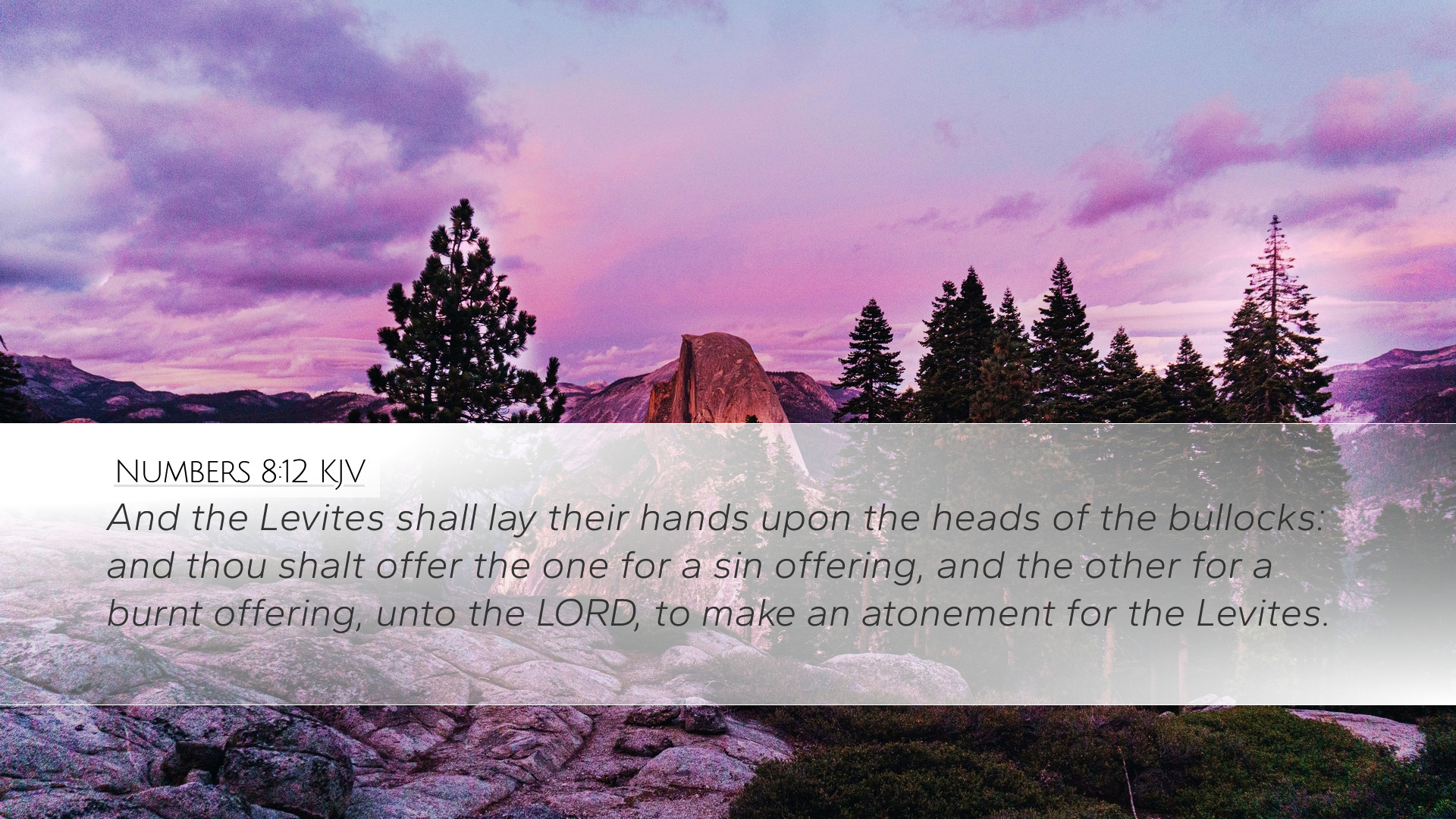Commentary on Numbers 8:12
Numbers 8:12 states, "And the Levites shall lay their hands upon the heads of the bullocks, and thou shalt offer the one for a sin offering, and the other for a burnt offering, unto the Lord, to make an atonement for the Levites." This verse stands at a pivotal junction in the narrative of Numbers, emphasizing the significance of the Levitical priesthood and the intricate rituals of offerings in Israel's worship life.
Understanding the Context
To adequately comprehend Numbers 8:12, it is essential to explore the broader context in which it is situated. The Book of Numbers addresses the organization of the Israelite camp, particularly regarding the priesthood and Levites' roles as mediators between God and the people.
Role of the Levites
The Levites were chosen by God to serve in the tabernacle and perform the sacred duties required for maintaining the covenant relationship between Yahweh and Israel. Their service was not merely administrative but profoundly theological, symbolized through the acts of atonement and sacrifice.
Commentary Insights
Matthew Henry's Commentary
A profound insight from Matthew Henry indicates that the laying on of hands signifies the identification of the Levites with the sacrifices they were to offer. It demonstrates the principle that sin and forgiveness are intimately connected with the sacrificial system instituted by God. The sin of the people was transferred symbolically to the offering, portraying the concept of substitution that is prevalent throughout Scripture.
Albert Barnes' Commentary
Albert Barnes adds that this act of offering the bullocks encapsulates the seriousness of sin within the camp of Israel. He notes that it reinforces the Levitical role, affirming that their work was not only service but also involved atonement for their own sins and those of the people. This dual responsibility underscores the holiness demanded of the priests and Levites as they approached the holy tabernacle.
Adam Clarke's Commentary
Adam Clarke emphasizes the importance of the offerings as vital to worship. He highlights that the sin offering represents a profound acknowledgment of human guilt and the need for divine grace. The burnt offering, contrastingly, is an act of total dedication and surrender to God. Together, they depict the essential duality of confession and commitment that characterizes true worship.
Theological Implications
- Atonement: The necessity of atonement for the Levites indicates that even those chosen to serve in sacred duties are not exempt from the need for purification. This principle echoes in the New Testament where the high priest, Jesus Christ, becomes the ultimate sacrifice for humanity's sins.
- Servanthood and Sacrifice: The Levites’ offerings serve as a reminder for contemporary believers of the call to sacrificial servanthood. Just as the Levites bore the burden of the people's sins, modern-day Christians are called to bear one another’s burdens and serve sacrificially.
- Holiness unto the Lord: The concept of holiness portrayed through the separateness of the Levites for service in the tabernacle carries significant weight. This notion speaks to the ongoing sanctification process required of all believers, as they too are called 'a chosen generation, a royal priesthood'.
Practical Applications
Given the theological richness presented in Numbers 8:12, several applications can be drawn:
- Preparation for Service: Before engaging in ministry or service, it is necessary for believers to examine their hearts, repent of sin, and seek atonement, paralleling the Levitical requirements for purification and offering.
- Understanding Sacrifice: Grasping the concept that true worship involves both confession and dedication encourages a holistic view of living for God. Sacrifices are not just ritualistic actions but heartfelt expressions of love and devotion.
- Emphasizing Community: The corporate nature of sin and forgiveness as modelled in this passage invites pastoral leaders to foster communities that support one another in accountability, prayer, and service.
Conclusion
Numbers 8:12 invites a deeper reflection on the role of atonement and the nature of God's calling. The combined insights of notable theologians serve as a rich resource for understanding the complex interplay of sin, sacrifice, and service. As pastors, students, and scholars delve into this passage, they uncover layers of meaning that inform their relationship with God and the call to holiness in their ministries.


